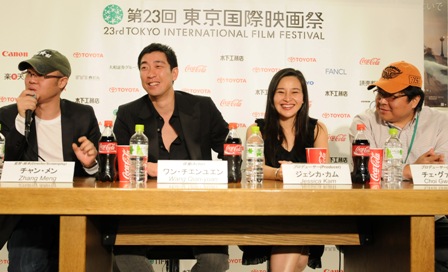2010.10.28
[Event Reports]
10/28 (Thu) Competition "The Piano in a Factory" Press Conference: Notes & Quotes

Date & Time: October 28th (Thursday), from 13:00 @Movie Café
Appearance: Zhang Meng (director/screenplay), Wang Qian-yuan (actor), Jessica Kam (producer), Choi Gwang-suk (producer)

©2010 TIFF
Here are some notes and quotes:
Zhang Meng (ZM): I love Tokyo and I love the Tokyo International Film Festival.
Wang Qian-yuan (WQY): I am very excited to see so many members of the press here today. It's also great that our film is in the Competition section. I hope everybody will enjoy this film.
Jessica Kam (JK): We had a chance to meet so many great producers, directors and filmmakers. We've learned a lot.
Choi Gwang-suk (CGS): It is an honor to have our film at this wonderful festival.
Q: This film uses various kinds of music such as Russian and Spanish folk music. Did you have any particular effect in mind and what is the relationship to the theme?
ZM: When you use music from different countries, some are melancholic or passionate. Most of the music I used is from Russia and Germany because these are, or were two socialist countries. I wanted to have a touch of the socialist times in this film because China is socialist, and using such music makes these 3 countries resonate with each other. The Russian folk music, Troika is popular in China. There was a time when a lot of people from the Soviet Union came to north eastern China which is how this song spread throughout China. As for the song "Kampai" by Tsuyoshi Nagabuchi, I must say that as a lot of music came in to China through Taiwan and Hong Kong, I wasn't aware it was a Japanese song.
Q: Mr. Zhang, how did you come up with this story? Mr. Wang, do you have a memorable gift from your father?
ZM: What motivated me to come up with this story is quite simple. Presently, China's economy is growing very rapidlyŌĆöperhaps too rapidly. I feel that a lot of people are being left behind. Through these changing times, it was the factory workers who contributed to China's current growth. I wanted to remember that fact, especially in times when it seems a luxury to stop and reflect upon the past.
WQY:The love of a father towards his child is very deep anywhere in the world. How this love is expressed varies from person to person. I remember as a child, my father handmade me toy guns and sleds. Actually, while shooting this film, the director gave me a very special chance to be in the film with my father who has been an actor for 50 years now. He plays the role of an old factory technician called Wang. During the shooting, my 70-year-old father was constantly looking out for me and I really felt his deep affection. I love my role in this film and I love my father, too.
Q: How did the two producers from Korea and Hong Kong get involved in this film?
JK: It is indeed an international team that we have. The director and actors are from China and I myself am from Hong Kong and the United States. I met the director at the Shanghai International Film Festival last year. He was pitching this story to investors. I red the story, loved it, and decided to produce it with him. We also have Kwak Jae-young, the director of My Sassy Girl as our executive director, and our cinematographer is Shu Chou from Taiwan. ItŌĆÖs a great experience working in such an international environment except for that we need so many interpreters!
CGS: Previous to this film, I was involved in the film, Lucky Dog with Mr. Zhang Meng. We were already talking about making this film together since then.
ZM: Our team really is international but we are all film loversŌĆöour common goal is to create a wonderful film. Perhaps if we had a large budget things might have been different, yet all we had was passion. I am extremely grateful for the actors and staff because they all got together without guarantee of any payment. Thank you so much.
The Piano in a Factory
 Film Information
Film Information



